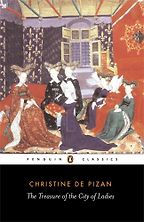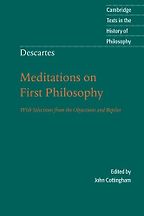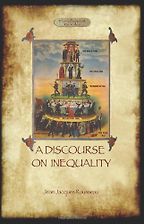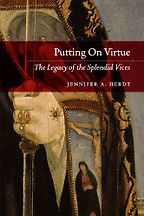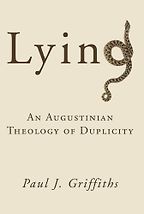My first question relates to a study that you mention in your book that suggests we all lie three times during every ten minutes of conversation, and even more frequently when we’re using email and text messages — which I can really relate to — do you think we lie more now than we did during the Middle Ages or Renaissance?
This is a question I’ve been thinking about: there are more people today, and more forms of communication that can reach more people, so quantitatively there must be more lies now than ever before. But people have always thought that there have never been so many lies than at the present, whenever that present was. John of Salisbury, in the Twelfth Century, cannot believe how many liars surround him like a cancerous disease. I think it’s a constant in the human experience — we always think there have never been so many liars as there are right now.
Like always thinking the apocalypse is just around the corner — everything’s awful now and was great in the past.
Don’t you remember how good music was in the eighties?
In your book, you examine strands of thought emerging in the Middle Ages through to the early eighteenth century. In doing so you undermine this common idea of a huge divide between medieval and early modern thought: do you know why such perceptions endure?
I think it’s because even today when people think about the Middle Ages they think ‘Oh, it was a religious society’ and therefore whatever theologians wrote reflects what everybody thought at the time, and that during the Renaissance society becomes more worldly or secular. But if you look at people who aren’t theologians in the Middle Ages you actually find a huge variety of opinion about religion and how to live our lives.
“We always think there have never been so many liars as there are right now.”
This is exactly what happens with the history of lying. When historians want to learn what people in the Middle Ages thought was lying they look to official theological discussions, Sentence commentaries and the like. They don’t examine places that really muddy the water: commentaries on what happened in the Garden of Eden, or the life of Christ, or the Eucharist — places where people worry about whether God can lie. Even among the theologians there’s a much greater variety than people think.
I was also thinking about all the lying in romances: adulterous couples like Tristan and Iseult, and Guinevere and Lancelot…
Exactly — in these hugely popular romances everybody lies and deceives. Sometimes the liars and deceivers are looked down upon, but often they’re seen as clever and resourceful.
There’s a lack of proper breadth in scholarship. I framed the book around a question: ‘Is it ever acceptable to lie?’ and it immediately occurred to me that it depends on who asks the question. I thought about who would be representative characters or people to ask the question and what answers they would give. So I thought about the Devil in the Garden of Eden; whether God could lie; the standard theological discussion about whether human beings could lie; courtiers; and finally women — who tend to get ignored in discussions of lying. There’s a whole literature out there on women as natural born liars that derives from a misogynistic tradition rooted in both Greek medical thinking and biblical interpretation.
Why do women get ignored in the scholarship around lying?
Most scholars examine what Augustine or Thomas Aquinas or similar sorts of folks write in their explicit discussions of lying. In these writings, theologians are wholly disinterested in the differences between men and women, there are only human beings — which is really shorthand for ‘men.’ Women as liars appear in other places, in commentaries on the temptation story in the Garden of Eden, in misogynistic poems. Or in writings by women themselves.
Do you want to outline what Christine de Pizan does in The Treasure of the City of Ladies and how she addresses deception in that book?
The Treasure is a handbook written primarily for princesses and noblewomen (with much shorter discussions concerning other classes of women). Christine takes as a given that you don’t have to be a nun to live a religiously satisfying life. She asks: ‘What does the noblewoman or princess have to do to be virtuous?’
What’s great about her advice is how canny it is. Princesses and noblewomen were often stuck in arranged marriages, living away from their homes and families in distant courts or manors. They would have been strangers in their new homes, surrounded by people jealous of their position and envious of their access to the king or lord. Christine describes it as a situation full of uncertainty and lurking danger.
Christine asks how the noblewoman can live virtuously in a world in which she can’t be sure of anything. She argues that the noblewoman’s prime social goal is to be virtuous and charitable, to create social harmony. She is the key to maintaining peace in a court filled with intrigue and backbiting and envy. It is a perilous situation and in perilous situations often the moral command to be charitable will outweigh the demand to be truthful. In such cases, she argues the noblewoman must dissemble, sometimes lie, to protect herself, but always with the larger goal in mind of protecting her husband and the harmony of the court.
She tells the noblewoman that she should go to church, but only when she knows people will be there so that they’ll see how virtuous and religious she is. Christine advises giving donations when people will see you do it. She says at one point that this may sound like hypocrisy, but that’s ok. She’s a wonderful writer.
How does she counter accusations that women are inveterate liars?
In the Treasure she doesn’t, because she’s already dealt with those problems in the book that precedes it: The City of Ladies. The reason women were thought to be natural born liars is because they were thought to lack prudence. Prudence is the virtue or ability to discern the proper course of action at the proper moment. The prudent man can know when circumstance requires him to lie. Since women lack prudence, so this misogynist tradition runs, they just lie all the time.
As I read it, The City of Ladies proves that women possess the virtue of prudence. Therefore when a good woman lies, it’s because the situation demands it. Having demonstrated women are rational and prudent in the City, Christine writes the Treasure to teach them how to put that prudence to work.
How does this relate to clothing — and the idea that women dissimulate all the time?
There’s this old idea — it can already be found in Revelation — that not only is the Bible the inspired word of God, but that to change one word of it, one comma, is to defy God.
A strand of early Christian thought, drawing on the idea that there are two divine books — the book of nature and the Bible, contended that when a woman makes up her face or dresses in fine clothes she is silently critiquing and amending God’s creation — arguing, in effect, ‘God could have made me better had he added this.’
Of course men do the exact same thing and Christine points this out. But it’s subsequent writers, particularly late in the Sixteenth Century, who really begin to point out that style and adornment are not feminine things, they’re human things.
I trace this to two Venetian women, Lucrezia Marinella and Moderata Fonte, both writing around 1600. Fonte’s work, The Worth of Women, is framed as a dialogue among women to demonstrate all they know but the subtext is much darker as it constantly highlights how men limit what women can do and think, that men are more dangerous deceivers than women.
There’s been a lot of debate around Christine’s feminism and is this a point where we see her not being as feminist as these later writers?
She is a feminist to the extent that she is very explicit that women can do all the things men can and that when women have had to rule countries, or make laws, or save their families, they have done as well as or better than men. On the other hand she believes late medieval society is set up as it is for good reasons. I think it cuts both ways with her.
What isn’t a deception for Descartes?
Ultimately for Descartes the soul’s presence to itself is the foundation of truth. And he uses that to convince himself that God is not a deceiver.
You talk about how he grapples with the biblical evidence, that after him: ‘God would forever be freed from the charge of lying, but at the cost that he would never play any active part in the world’.
For Descartes the challenge is that there are two ways to think about God: conceived philosophically God is eternal, perfect, unchanging, and certainly no deceiver; conceived biblically God seems rather fond of the occasional deception.
Descartes is fairly clear that he really doesn’t much want to bother with the Bible, that it is not particularly relevant for the new science he hopes to establish. At the same time, he doesn’t want people to think there is anything in the Bible that undermines his new science. He adopts something of a traditional criterion for reading the Bible — the Bible speaks the language of its time. In other words, to the simpler and less educated people who lived thousands of years ago God spoke in figures and allegories, as if he were a person like the rest of us. When the Bible describes God as deceiving we’ve got to keep this sort of accommodation to the times in mind. Scripture describes God as deceiving because that’s all those poor ancient uneducated people could grasp. Up-to-date and educated as we are, we must discover what God was really up to because, whatever he was up to, it certainly wasn’t lying.
Descartes, like the other bright lights of the Scientific Revolution, wants a God who is the source of order in the universe, a God who sets up a few basic laws on which the universe just operates. The ideal universe for Descartes is the one with the fewest number of laws resulting in the greatest amount of order.
Get the weekly Five Books newsletter
He will argue that sometimes from our perspective things might appear to have gone wrong. For example, someone suffering from dropsy retains copious amounts of liquids in their tissues while simultaneously feeling parched — should they drink, they might literally drown from within. It may seem in this case that God has set this person up to be deceived, that He has constructed their body to lie to them. This is the wrong way to consider their predicament. By and large and for the most part the system does work — when we need water, we feel thirst. God could miraculously interfere and resolve this one problem but that would clutter up the simple beauty of the overall system, it would violate the aesthetic simplicity of God’s wisdom, justice and reason.
How does this relate to exegesis — that one has to pay close attention to what God actually does in the Bible?
Biblical exegetes had to deal with the fact that, at the very least, God seems to interfere in the world — he talks to people, he destroys cities. Often they imagine God as a kind of super rhetorician or orator: he speaks and acts as befit the circumstances.
Descartes wants a God that doesn’t speak, because speaking is tantamount to interfering with the orderly and law-like operations of the world. For Descartes, God gives up rhetoric for the ideals of philosophy. God sets up a world system and then watches it. And Descartes is not alone in this new ideal for God. We see it in Pierre Bayle’s Dictionary and in Robert Boyle’s Treatise on the Vulgarly Received Notion of Nature.
So is it the case that the natural world ceases to be a book in which we can read the divine plan?
Yes. It’s precisely through this problem of divine deception and biblical exegesis that you get the mechanisation of the world. The conceptual transformation of the world into a vast machine passes straight through the problem of divine deception.
And does this lead to more atheism?
Maybe, maybe not. For some people, like William Paley, it becomes the greatest proof for God’s existence. If the world is a vast machine then, like any machine, it needed to be designed and created. Who could have done that other than God? Even Darwin, at the beginning of his career, supports Paley. It’s only as his career develops that he comes across a way to explain the appearance of order without having to invoke an orderer.
Moving onto Rousseau and his Discourse on Inequality. Could you outline what that book told you about deceit?
Rousseau is one of the first people to offer an entirely non-religious account of the origins of deception. Before Rousseau people tied lying and deception to the Garden of Eden, the Devil and original sin. Remember that the gospels tell us that the Devil is the father of lies. Rousseau rejects the notion of original sin, he doesn’t think it explains anything, and argues that the reason we lie is because we are social creatures.
In the Discourse he offers a rather inventive account of primitive human life. In those earliest days human beings lived alone and were content. Things happen as they do and eventually we came to live with others and this became the source of many problems. Once we live in groups we cannot help but compare ourselves to others. We notice that some people are more talented than we are, are smarter or more handsome than we are, more charismatic, caring, popular or mysterious. And so people begin to pretend to be what they aren’t, mimicking others who have things we want. We lie because we are social.
Rousseau is the first to argue that lying is not a religious problem: it is a natural phenomenon. We lie to get ahead and this leads to a new sort of diagnosis of the human condition. We no longer suffer from original sin, we suffer from insincerity and inauthenticity. We are no longer true to ourselves. We put on façades to impress people and impressing them, we lose ourselves.
Is he suggesting that we should return to being savages? He doesn’t seem to be against owning property…
No, he thinks it’s impossible to go back because society exists. His ideal is not to be honest or to tell the truth, it’s to be authentic. To overcome the problem of society is to ‘be true to yourself’: this is where we get this language. In the Reveries of a Solitary Walker he offers a long meditation on lying only to conclude by writing something like, ‘I might hold that I should never lie because truth is a virtue, but I’m not really up to that, so sometimes I’m going to lie, and as long as that’s who I am that’s ok’. It’s an entirely new ideal.
Let’s move on to Jennifer Herdt’s Putting on Virtue. Can you outline her ideas?
The topic of Herdt’s book is whether a person can pretend to be virtuous in order to become virtuous, whether we can pretend to be acting from virtuous motives in order to one day truly act from virtuous motives.
So if a person deceives him or herself into believing he or she is virtuous, and then commits several virtuous acts, is this acceptable?
That’s complicated! Generally, the definition of whether you lie or not is whether you are knowingly doing something or saying something that you think is false. But in the religious tradition for an act to be truly virtuous it has to be an act inspired by charity: it requires grace. So, if you are performing acts of virtue without the requisite grace your actions may not be virtuous at all.
In the seventeenth century — in the wake of the Reformation — self-deception becomes a huge problem. The Protestant ideal is that if you have grace whatever you do can be virtuous, but if you lack grace and you try to act from virtuous motives, you’re actually prideful. You think you’re doing something, but only God can do something for you.
Francois La Rochefouçauld worries about this, Pierre Nicole worries about this, Pascal worries about this. They get to the point where they argue that self love is potentially so great that you could even be a martyr and die for you faith out of self love and you wouldn’t know it! We can never tell if what we do is actually virtuous.
And so how can we respond to that?
Herdt’s book is so good because she lays out how a classical vision of the acquisition of virtuous habits gets gutted with the Reformation insistence on justification through faith alone.
The classical idea goes back to Aristotle. He thinks that we can become magnanimous or virtuous through the performance of virtuous and magnanimous acts. We begin to do these things when we are not yet good people and by doing them we slowly make ourselves into the virtuous person we longed to be. Protestant thinkers and the Catholics they influence criticize this process, they call it ‘putting on virtue.’ It is like putting on a costume of virtue over our inherently sinful selves. They worry that it’s just teaching people to become hypocrites.
Most Catholics all along argued, and re-argued after the council of Trent, that God had set up a system whereby if we do certain things then He will do things for you — baptism, confession, good works. By contrast, in the Treatise on Works, Luther essentially argues that once you’re justified, anything you do is virtuous. Before God there is no difference between picking up a pencil or saving someone’s life so long are you are justified.
Justified here in the sense of you having achieved grace?
Yes, that God has made you one of the elect.
For many people after this it becomes harder and harder to tell whether their actions are virtuous or not. Soon lying seems more and more central to a functioning society. Pierre Nicole will argue that, superficially, a society in which everyone operates from principles of self-love will be indistinguishable from a society in which everyone acts from motives of charity. Self love actually has the capacity to mimic charity. This is what Bernard Mandeville contends in The Fable of the Bees. We are all prideful, look only after ourselves, and lie wantonly. Society flourishes because of our bad behavior, not despite it.
“Conceived biblically God seems rather fond of the occasional deception.”
If that’s the case, lying starts to look necessary and not demonic and at that point Rousseau is merely a step away contending that lying is an entirely natural phenomenon. This is why ‘The Devil Wins’ is the title of my book. For millennia people believed lying was a demonic disruption undoing the perfect world of Paradise, by the seventeenth and eigthteenth century, people look around and fear that without our lies society would fall apart. Lying is what allows us to get along with each other. It’s as if God listened to the Devil and realized what a horrible place this world would be if we actually told one another what was actually on our minds. Imagine a day in your life when you don’t lie and you’ll catch my drift.
So could you say this huge focus on grace and predestination encourages secularisation?
Yes, at least when it comes to lying. It surprised me that I ended up writing a secularisation book because I certainly didn’t intend to. But it seems this is how lying and all the things associated with lying become natural.
Let’s move on to your last book, Paul Griffiths’s Lying: An Augustinian Theology of Duplicity. You write — I think in a footnote — that you learnt a great deal from this book, and I wanted to ask what that was?
This book gives the single best account of Augustine’s philosophy and theology of lying. Griffiths actually accepts Augustine’s theories as true, which I think leads him to give a very sensitive account of what Augustine argues.
Five Books interviews are expensive to produce. If you're enjoying this interview, please support us by donating a small amount.
He relates Augustine’s prohibition against lying to Augustine’s conception of God and what it means for us to be made in the image of God. The Gospel of John is hugely important to Augustine in this regard. The Word perfectly embodies God; the Word made Flesh perfectly embodies the Word. By extension, Augustine argues that in whatever we do or say, we too must embody truth to the best of our ability.
This is why Augustine can be so clear that we must never lie. Even if we lie to save a life we destroy our likeness to God. Griffiths gives a clear, sensitive account of that — and makes it very plausible, if you can accept Augustine’s premises.
He then goes and compares Augustine to a number of other subsequent writers on lying to prove that none of them are as good as Augustine. I tend to lose patience at that point because I myself don’t really accept the Augustinian premises to begin with. But to understand Augustine, Griffiths’s book is just superb.
In On Christian Doctrine Augustine describes speech as a little version of the Incarnation. Could you say that as well as destroying our likeness to God when we lie it’s also a bastardised form of the Incarnation?
Right — and more than that, Augustine argues that it turns us into the Devil because the Devil disobeyed God, decided for himself what he should and shouldn’t do. So when we decide what is good and bad we mimic the Devil. We are saying ‘God is not the image we should follow; we are the image we should follow’, which would be a bastardised version of the Incarnation as well.
For Augustine is it all about the moment of transfer from something within to outside your body — that it has to come out the same as it is within?
Yes. Griffiths constantly frames it in terms of the duplicity of heart: you’re one thing on the inside you’re something else on the outside — you break that link. There should be a unity in us that enacts the unity in God. When we lie we divide ourself from ourself and that division is the turning from God.
Get the weekly Five Books newsletter
That seems also to be quite an important Early Modern idea?
I think it’s there in the entire tradition of lying, that you have something inside and you put on something different outside. This is why I don’t put a lot of credence in discussions of the invention of the self and the subject. As soon as we know how to talk we know the difference between the inner and the outer. It’s not surprising it’s in Hamlet because it’s already in Homer: when Odysseus comes home he lies to Penelope, and for Homer it is all about what Odysseus hides and what Odysseus reveals.
You wonder how people were supposed to have thought before the subject was invented. It’s not as though suddenly in the twelfth century you’re like ‘Oh my God, I’m a subject.’
‘Oh no, I can think for myself.’ But this goes back to the fact that when Early Modern historians want to set up contrasts they’ll compare Renaissance humanists with medieval monks and act surprised when that they wanted different things out of life.
Finally, I wanted to ask whether you find yourself, after the book, second-guessing whether everything you do is truly good or just hypocritically good?
In my real life?
Yes
I have to say, no. Though I do get emails occasionally from people who want moral advice. And it’s got me thinking — I wrote a book about the history of lying, and people really want to know whether lying is ok or not. Now I am thinking about what the history of lying has to do with lying and the history of ethics with ethics. Having done all this work, it seems I ought to have some practical advice. It’s odd though, practical advice is often the hardest to sort out.
Five Books aims to keep its book recommendations and interviews up to date. If you are the interviewee and would like to update your choice of books (or even just what you say about them) please email us at [email protected]
